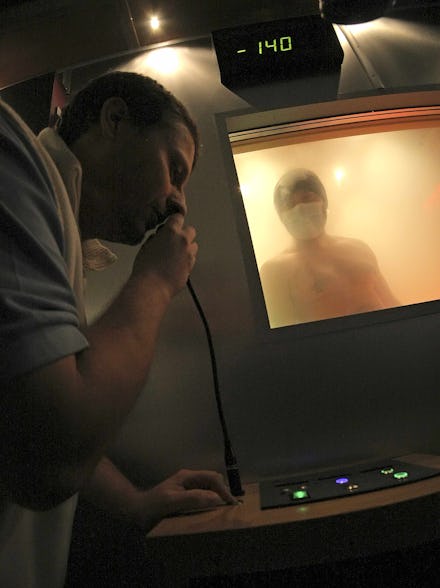Scientists May Have Just Figured Out How to Preserve Memories Forever

The science of cryonics — preserving living (or dead) beings in low temperatures until they can be resuscitated — is the stuff of urban legends about Walt Disney, sci-fi cartoons and B-movies. But every once in a while, we edge a little bit closer to icy immortality.
Scientists in Arizona have released a study in which they taught a small group of worms a memory, cryogenically froze them and brought them back from cryostasis. Here's what's exciting: Their memories stayed intact.
First, the researchers used olfactory imprinting (teaching something to recognize a smell) to create a memory in a small group of C. elegans, a kind of tiny, transparent worm. You might know them as a species of "nematodes" or "roundworms" — they're often chosen for neural experiments because they have primitive, easy-to-observe neurological structures.
The worms were taught to recognize the smell of a substance called benzaldehyde, an almond-scented compound, so that they moved when they smelled it. They were then frozen using a rapid process called vitrification, which uses liquid nitrogen to freezes the worms without any ice formation.
When the worms were thawed, the worms that were imprinted were twice as likely to gravitate toward the almond smell, indicating that the worms retained the long-lasting imprint of benzaldehyde even after being frozen.
The Immortality Project: The study came out of the Alcor Research Center in Scottsdale, Arizona, which is part of a foundation dedicated to solving the mysteries of cryogenics. They also keep a bunch of bodies on ice until the day comes when we can wake them back up again.
At Alcor, you can pay $200,000 for a full-body preservation, meaning your entire body will be frozen after you're declared legally dead, then kept safe until science advances to the point when your mind and faculties can be restored. For $80,000, you can simply opt for neurocryopreservation, where just your head is frozen.
Alcor insists that its "members" aren't technically dead:
The object of cryonics is to prevent death by preserving sufficient cell structure and chemistry ... If indeed cryonics patients are recoverable in the future, then clearly they were never really dead in the first place. Today's physicians will simply have been wrong about when death occurs, as they have been so many times in the past. The argument that cryonics cannot work because cryonics patients are dead is a circular argument.
As of now, Alcor has 136 people in cryostasis.
Cryonics is still a pipe dream: Someday, in the far future, it may be possible to revive humans from a totally frozen state. But cryonics has a long way to go, and it's attracted many high-profile skeptics.
We're still a long way off from being able to successfully revive a cryogenically frozen person. Unlike animals that successfully freeze or hibernate, the human body doesn't have the chemical makeup to survive being frozen without effectively destroying essential cell tissues.
No human has ever regained consciousness and shown signs of life after cryogenic freezing, at least so far. And if humans can wake up after a long icy sleep, we're going to want more brain function than the ability to smell almonds.